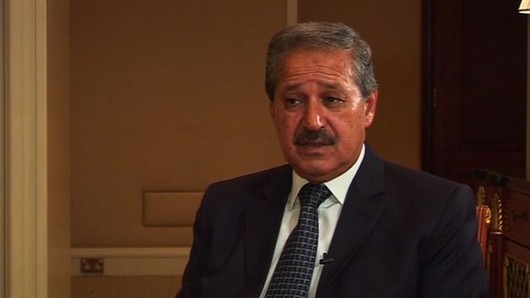The most senior Syrian politician to defect to the opposition has told the BBC the regime will not hesitate to use chemical weapons if it is cornered.

Nawaf Fares, ex-ambassador to Iraq, said unconfirmed reports indicated such weapons might have already been used.
He also said that major bombings across Syria had been orchestrated by the regime in collaboration with al-Qaeda.
Meanwhile, UN-Arab League envoy Kofi Annan is due to hold talks with Russian President Vladimir Putin on Syria.
Russia is a key ally of Syria and the meeting comes amid mounting pressure for tougher international action against the country.
Syria has been in turmoil since March last year when an uprising against the government of President Bashar al-Assad began.
UN Secretary General Ban Ki-moon is due in Beijing for talks with the Chinese leadership, which has joined Russia in vetoing sanctions.
Diplomat efforts come as UN officials complained of huge obstacles put in the way of its aid operation in Syria.
‘Wounded wolf’
Syria is known to have a significant stockpile of chemical weapons. There have been growing concerns in neighbouring countries and among Western governments about the security of such weapons should the regime fall.
Asked if he thought President Assad might use chemical weapons against the opposition, Mr Fares told BBC security correspondent Frank Gardner in an interview in Qatar that he would not rule it out, describing Mr Assad as “a wounded wolf and cornered”.
“There is information, unconfirmed information of course, that chemical weapons have been used partially in the city of Homs,” he said.
Mr Fares’s claim that Sunni Muslim militants in al-Qaeda are collaborating with a regime dominated by those from the minority Allawite sect will surprise many.
Challenged on his view that al-Qaeda was collaborating with the regime despite this, Mr Fares said: “There is enough evidence in history that lots of enemies meet when their interests meet.”
He added: “Al-Qaeda is searching for space to move and means of support, the regime is looking for ways to terrorise the Syrian people.”
Mr Fares is the most prominent politician to defect since the uprising against President Assad began.
He has held senior positions in the ruling Baath Party and powerful security services, and served as governor in several provinces.
‘Elements of blackmail’
Violence is continuing to spread across the country and in the capital Damascus as rebels – now better equipped and more organised – confront the army and government-backed militia.
Witnesses say the capital is currently seeing the biggest military deployment in the 16-month uprising.
Activists reported continued clashes on the south-western side of the city, and said fighting had broken out on the other side, at Barzeh and Qaboun. Attack helicopters were seen there firing rockets for the first time since the uprising began.
Ten people were killed in Damascus altogether, they said, fewer than in the restive cities of Hama and Homs to the north.
State media gave little prominence to the fighting, but said security forces were pursuing remnants of a “terrorist gang” in Nahr Eisha.
The BBC’s Jim Muir in neighbouring Beirut says that while the fighting is significant it does not yet pose a direct threat to the main centres of regime power.
“It doesn’t occur to any Syrian, not only me, that Bashar al-Assad will let go of power through political interventions… He will be ousted only by force,” Mr Fares said.
Mr Fares was dismissive of UN-Arab League envoy Kofi Annan’s current visit to Russia, saying success there was “impossible”.
“Several months have passed and… the regime hasn’t implemented a single article of (Kofi Annan’s) plan.”
Meanwhile, US Secretary of State Hillary Clinton has told the BBC’s Kim Ghattas that she hopes Russia can be convinced of the need for a UN resolution mandating tough sanctions on Damascus if it fails to comply with Mr Annan’s peace plan.
“The Russians are very clear – they don’t want to give any opening for force that could be used,” Mrs Clinton said.
“And we’ve said: Let’s not jump to conclusions, let’s see if we can’t bring the full weight of the Security Council… to bear so that we can find how much that moves the ball forward,” she added.
Mrs Clinton said the US “was working very hard to try to have a managed transition” but that the clashes in and around Damascus showed that the end of the Assad government was “a matter of time”.
Russia and China have blocked two previous UN resolutions that condemned President Assad’s government for the continuing violence.





